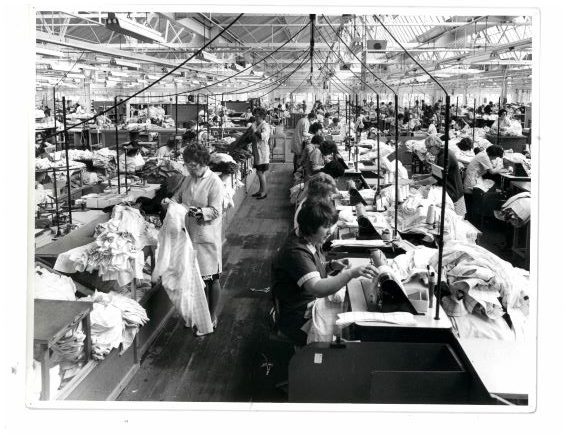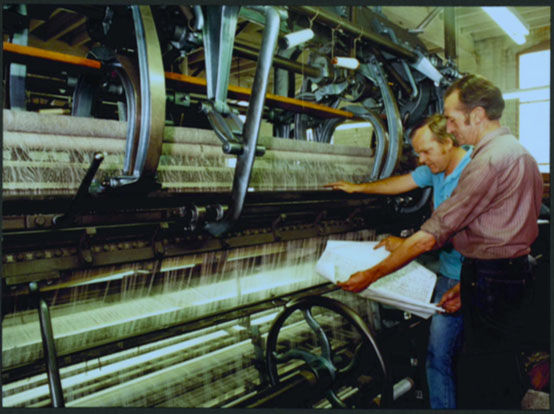
Photo courtesy of Margaret Sears
Sounds can be most evocative of the workplace, and were often mentioned in our interviewees’ descriptions. A Manager considered the sensory experience of visiting factories with his father to be a contributory factor in choosing to go into the industry himself – ‘I got to like the smell and the sounds of factories’.
The machines, making the loudest noise, are the most obvious focus, but there were many other sounds that were recalled in the interviews. A machinist who came to our Ruddington roadshow described how she would listen to music on her ‘Walkman’ and borrow ‘story tapes’ from the library to listen to whilst she worked. At John Smedley’s, doing paperwork on a Saturday was made easier by listening to the ‘Derby v Forest’ match: ‘I’d got the tranny on in the window, I’d listen to the match and work away…’
Radios, music and singing were fondly remembered, although some suspected that having the radio on might also benefit the employers. One of our attendees at the Ilkeston event recalled ‘they put music in to make production quicker, and it worked’. One of the attendees at our Mansfield event commented that ‘one of the noisiest parts was when Frank Sinatra came on the radio and everybody sang – it was magical’. At Viyella, in Hucknall, we were told that you could sometimes take records in to play, and one worker also recalled various pop groups and the radio show ‘Workers Playtime’ visiting the factory. Some workers were not so lucky, as one lace worker we interviewed commented that it was ‘strict’ and that they all ‘got into trouble for singing to Workers’ Playtime’. Another Ilkeston worker recalls an incident that led to him and his workmate being told off by the foreman. He described their workshop, which was next-door to a small house where a family lived. One evening during a 9pm shift, his workmate decided to accompany the pop group Dave Clark Five, with their song ‘Glad All Over,’ singing and drumming using a spanner on an oil drum. As he did this whilst the machines were also running, it created such a noise that ‘before long, someone came knocking’.
In some departments, the machines were too loud for a radio or even spoken communication. One interviewee described the intense noise made by the wooden tubs and beaters in the Wash House at John Smedley’s. According to our interviewees, particular machines were especially noisy. The leavers lace machines and textiles machines using ‘fluidics’ systems were singled out. Several machinists pointed out that they got used to the noise from industrial sewing machines, but one recalled visitors coming round and asking them ‘how do you work here? the noise!’ One interviewee recalled that the noise in the ‘knitting shop’ was so horrendous ‘you learned to lip-read’. Many of our interviewees mentioned that ear defenders were required in more recent times when safety measures tightened.
So, in 1981, when the textile workers marched on Nottingham’s Market Square singing ‘if you’re wearing foreign knickers gerrem off’ perhaps all that singing in the factory had given them a taste for it..?
article by Tonya Outtram
Here, our interviewee describes the sounds of the sewing machines at Atkins of Hinckley.

One of the machines singled out for being particularly noisy – the leavers lace machine – photo courtesy of Mary Shaw